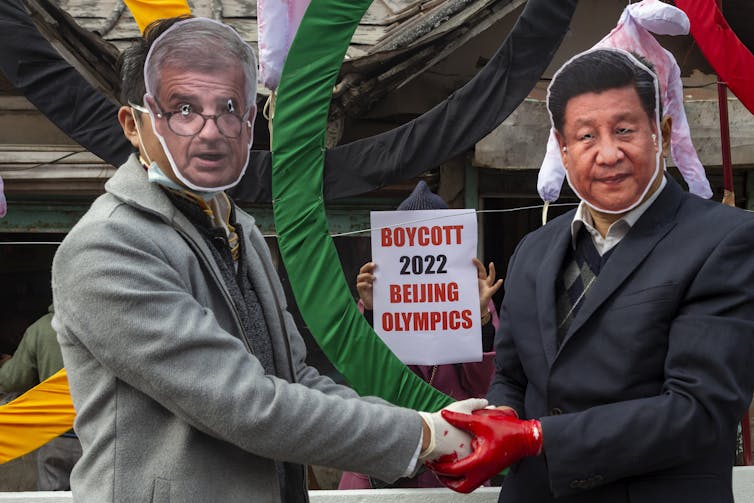Robert Huish is an Associate Professor in International Development Studies at Dalhousie University and Simon C Darnell is an Associate Professor, Faculty of Kinesiology and Physical Education at the University of Toronto.
In ordering a diplomatic boycott, but not an athletic boycott, of the Beijing Winter Olympics, U.S. President Joe Biden effectively pulled his goalie from the net.
China and the United States continue to face off over how “people and economies should be governed.” Following a virtual summit, Biden and China’s President Xi Jinping expressed longstanding grievances against each other.
In protest of an “ongoing genocide” in Xinjiang amid other human rights abuses by Beijing, Biden’s diplomatic boycott of the 2022 Olympic Games is mostly a half measure that will annoy Beijing and could put U.S. athletes at risk.
Within a day of Biden’s announcement, Canada, the United Kingdom and Australia followed suit with the same half-measured stance.
Hostage diplomacy
Xi’s government has a proven track record of punishing anyone who disagrees with it — including athletes and sports organizations. In 2019, Houston Rockets general manager Daryl Morey tweeted “fight for freedom; stand with Hong Kong.” China responded by suspending all business ties with the franchise. The country also recently banned all Boston Celtics games after Celtics’ forward Enes Kanter expressed public support for a free Tibet.
Beyond broadcasting rights and business ties, China has a proven track record of hostage diplomacy. China only released the “two Michaels” — Michael Kovrig and Michael Spavor — in exchange for Huawei’s Meng Wanzhou this year.
The country has been known to use U.S. allies, like Australia and Canada, as “proxy punching bags.” China puts pressure on them, so the allies in turn pressure the U.S.

All of this begs the question: Is China beyond punishing Olympic athletes from a country engaged in a diplomatic boycott?
Could arbitrary charges be imposed by Beijing on athletes who express dissent against the country’s treatment of Hong Kong, Taiwan or the people of Tibet and Xinjiang? Could athletes be detained if drug tests come back positive? What actions could occur if athletes test positive for COVID-19?
These are all questions that diplomats and political leaders are good at handling. But for the U.S., and now several other nations including Canada, they won’t be there to help during the games.
Practical risks to athletes
Although regular diplomats will be present in the country to assist with consular situations, this might not be enough to protect athletes. The diplomatic boycott of the Olympics has angered Beijing enough that the city has threatened retaliation through “resolute countermeasures.”
Hopefully, these countermeasures will not include arbitrary detainment of athletes, but there is no guarantee.
What’s more, the U.S., Canada and several other countries have not signed on to the “Olympic Truce,” a UN resolution document that ensures a peaceful environment for the games and safe passage for all athletes. This high-level symbolic diplomatic duelling brings about real practical risks to athletes.
This is not the same as arguing against political activism in sport, which is to be acknowledged and even celebrated. We aren’t moved by the argument that sports should stay out of politics.
We understand the perspective that a sport-based boycott will likely not force China to change its policies, to stop committing genocide, acts of global espionage and vengeance against its citizens. And we are sympathetic to athletes who want to be allowed to compete so they do not miss their one chance at the Olympics.
But those arguments can obscure the fact that hosting the Olympics is used by nations like China, as a way to build prestige and consent for their national brand and policies.
They use sport to normalize and entrench themselves geopolitically. So when foreign athletes go to the Olympics in Beijing it says, “We’re basically OK with what China is doing.” Or at least, “We don’t care enough to do anything about it.”

Boycott the games entirely
Leaders shouldn’t be OK with China’s behaviour or abuses. Nor should the international community tacitly support China, or respond with taps of symbolic pressure. The real move to be made here is to boycott the games entirely. Athletes and all.
With the current political tensions, the gentle threat from world leaders like Biden, mixed with China’s proven track record of hostage diplomacy, puts athletes in danger.
Athletes are at risk of arbitrary detainment as retaliation. Whether it be related to COVID-19 protocols, doping or dissent against China’s policies. And athletes from non-boycotting nations will be seen as complacent in this politically charged environment.
None of this will do much to advance the values of the Olympics, diplomacy or sport itself.
Protest is ultimately about sending strong messages to make change. Biden’s half measure of holding back diplomats, while sending in athletes — with Australia, the U.K. and Canada following suit — is short handed. As long as athletes stand witness to the Olympic flame in Beijing and compete in the games, complacency will overshadow any message of condemnation.![]()
This article is republished from The Conversation under a Creative Commons license. Read the original article.

